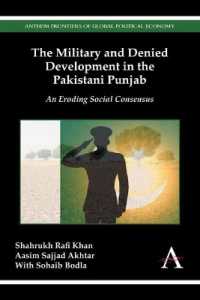- ホーム
- > 洋書
- > 英文書
- > Business / Economics
Full Description
This book explores the link between environmental knowledge management and the sustainability challenges being faced by organisations, individuals and society. Comprising both theoretical and empirical chapters, the volume describes how knowledge management and organisational learning can help achieve a sustainable tourism sector.
Environmental knowledge has become one of the most important resources for organisations in the current competitive environment. Organisations need to turn their knowledge into agile structures to respond to the challenges resulting from current and future environmental challenges, and from increased competitiveness and social changes. It is therefore important for business decision-making processes to be based on environmental knowledge instead of relying on unconfirmed, often biased information. In this vein, reliable knowledge structures and a framework become an imperative for sustainable development. Development of these innovations shall be addressed through systematic mechanisms such as integration of sustainability and environmental issues, attention to technological innovation, improved absorptive capacity, targeting social challenges as well as investment in human resource development.
The book will be of great value to students and researchers of social sciences with a focus on tourism, human geography, marketing, knowledge management and environmental studies. The chapters in this book were originally published as a special issue of Journal of Sustainable Tourism.
Contents
1. 1. Sustainability knowledge management and organisational learning in tourism: current approaches and areas for future development 2. Corporate social responsibility and strategic knowledge management as mediators between sustainable intangible capital and hotel performance 3. Developing sustainable business models: local knowledge acquisition and tourism lifestyle entrepreneurship 4. Greening hotels: does motivating hotel employees promote in-role green performance? The role of culture 5. Building dynamic capabilities in tourism organisations for disaster management: enablers and barriers 6. A safe space for local knowledge sharing in sustainable tourism: an organisational justice perspective 7. Conceptualising trust as a mediator of pro-environmental tacit knowledge transfer in small and medium sized tourism enterprises 8. Systems thinking to facilitate "double loop" learning in tourism industry: a COVID-19 response strategy 9. Responses to vignettes as a methodology to reveal hoteliers' sustainability practices, knowledge and competencies






